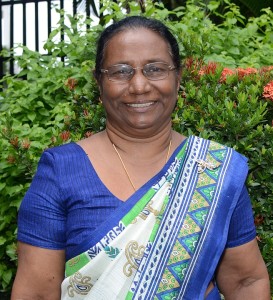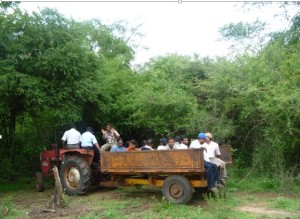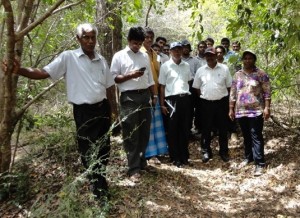
To mark International Women’s Day 2015 Lindha Langa spoke to Badra Kamaladasa, who is a leading voice in the water sector. She is the current chair of the Sri Lanka Water Partnership (SLWP). She had previously been the Director General of the Government of Sri Lanka’s Irrigation Department, where she was the first female to take the helm. She is a civil engineer and is married with three children.
by Renuka Jeya Raj
Lindha Langa: What are the challenges faced by women in the water sector in Sri Lanka?
Badra Kamaladasa: At the lowest level, the women farmers have no voice. They are not accepted in their villages because culturally, their jobs have long been male strongholds – it is the men who head farmer-level organizations. These women, in addition to their back- breaking work as farmers, have also to fulfill their domestic duties as wives and mothers. So they have no time to participate in the farmer meetings and other farming events that are expected of them, which are attended by their male counterparts with more time on their hands.
It is only over the past decade that women, like myself, arrived on the scene in a managerial capacity, so there was much resistance by farmer leaders to accept their authority. But women have performed well here and earned the confidence of their line departments and farmer leaders.
Working in irrigation is a 24/7 occupation, because one is either dealing with floods or with drought. It can be rather daunting for women at senior level who wear multiple hats as wives, mothers as well as professionals in the workplace.
Lindha Langa: What was your experience as the first woman to head the Irrigation Department in Sri Lanka?
Badra Kamaladasa: At first, it was difficult for some of my colleagues to accept me as their DG. But I had been in the irrigation sector for more than 30 years, traveled to many parts of the country on field visits, and knew the ground situation very well. I was aware of the problems faced by the officers, so when I gave orders, I knew the total picture beforehand.

I have had to make some tough decisions which several other senior male officials had hesitated to take, and so I was thought of as being an ‘aggressive’ woman who took decisions without considering their long-term consequences. But this improved once I established myself as making the right decisions based on fact rather than on personal opinion.
I was Sri Lanka’s representative on the ‘International Commission of Large Dams’ from the year 2000, which is the foremost organization for dam engineers. This was attended by dam engineers from 100 countries around the world. I was the only female country representative and was accompanied by some male colleagues. Once there, the other country representatives found it difficult to relate to the fact that I was a woman and kept addressing my male colleagues, who were compelled to tell them that it was in fact I who was head of the delegation!
But my work has brought me a lot of satisfaction. When I see the results, once all the preliminary studies and surveys are completed, the channels are constructed and the water flows into a remote village. Just seeing their happiness and the change that the water brings to their lives has been worth all the hard work that went with it. People in the rural areas have told me, “Give us water. That is all we want from the government.’
My husband gave me a lot of support. He took care of the family whenever I travelled to the field. He is a management consultant and trainer and was in the state sector and the Irrigation department. So he knew the ins and outs of the issues I discussed with him, and gave me invaluable advice.
Lindha Langa: What are the qualities that helped you in your role?
I listen to people.
As women, I think we can multi-task more effectively than men do and are still able to give each task our fullest attention. In the course of my work, I have had to shift from administration to finance to technical to political issues in a very short space of time.

I also believe in looking out for the welfare of all those who work with me and ensuring that their work environments are comfortable.
I have always appreciated people who deliver, and don’t just talk about what they can do.
Lindha Langa: How do you see the role of women in the water sector?
The water sector is changing rapidly. Many more women are coming in and in terms of numbers, there has been a shift from male dominance to female dominance. This is true not only in the water sector but in all professions in the state sector in Sri Lanka.
But, women also have special needs – of safety and hygiene- which must be considered. When I assigned a young female technical officer or engineer for a field trip, I have had to ensure her safety. Women also require adequate sanitation facilities. Despite this, I say without hesitation that women are more dedicated than their male counterparts. Yet, society accepts a task accomplished by a man over a similar one accomplished by a woman, even if the man delivers less.
One important area of focus are the women farmers. They have some hidden problems particular to women which must be looked into. Women officers may be more sensitive to their needs. Women help each other in our society.

